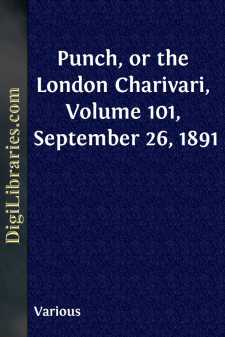Categories
- Antiques & Collectibles 13
- Architecture 36
- Art 48
- Bibles 22
- Biography & Autobiography 813
- Body, Mind & Spirit 142
- Business & Economics 28
- Children's Books 15
- Children's Fiction 12
- Computers 4
- Cooking 94
- Crafts & Hobbies 4
- Drama 346
- Education 46
- Family & Relationships 57
- Fiction 11828
- Games 19
- Gardening 17
- Health & Fitness 34
- History 1377
- House & Home 1
- Humor 147
- Juvenile Fiction 1873
- Juvenile Nonfiction 202
- Language Arts & Disciplines 88
- Law 16
- Literary Collections 686
- Literary Criticism 179
- Mathematics 13
- Medical 41
- Music 40
- Nature 179
- Non-Classifiable 1768
- Performing Arts 7
- Periodicals 1453
- Philosophy 64
- Photography 2
- Poetry 896
- Political Science 203
- Psychology 42
- Reference 154
- Religion 513
- Science 126
- Self-Help 84
- Social Science 81
- Sports & Recreation 34
- Study Aids 3
- Technology & Engineering 59
- Transportation 23
- Travel 463
- True Crime 29
Punch, or the London Charivari, Volume 101, September 26, 1891
by: Various
Categories:
Description:
Excerpt
THE WAITERS' STRIKE.
(At the Naval Exhibition.)
The German Waiter waxeth fat; he grows exceeding proud;
He is a shade more kicksome than can fairly be allowed.
The British Press goes out to dine—the Teuton, they relate,
Throws down his napkin like a gage, and swears he will not wait.
Now there are many proverbs—some are good and some are not—
But the Teuton was misled who cried, "Strike while the entrée's hot!"
Like readers with no book-marks, all the rebels lost their place,
And vanished out of Chelsea in their dress-suits and disgrace.
And I'm told that there were murmurings and curses deep and low
In darksome public-houses in the road of Pimlico,
And a general impression that it was not safe to cross
The temper of that caterer, Mr. MACKENZIE ROSS.
O Waiter, German Waiter! there are many other lands
Where you can take your creaking boots and eke your dirty hands;
And we think you'll have discovered, ere you reach your next address,
That in England German Waiters aren't the Censors of the Press.
"Keep up the Christopher!" a recommendation adapted urbi et orbi which, quoting Mr. Puff, our HENRY when speaking at Canterbury ought to have given after the unveiling of KIT MARLOWE's statue. We hope that the unveiling address will not prove unavailing, and that the necessary funds may soon be forthcoming for the completion of the work. For the present all that has been effected by the ceremony is to have given the Times and Telegraph opportunities for interesting leading articles at a very dull season when material is scarce; also it has given the author of Tom Cobb and other remarkable plays a chance of writing to the Times; and finally it has broken in upon the well-earned holiday of the indefatigable and good-natured HENRY. But there was one question not put by our HENRY. It ought to have arisen out of the record of MARLOWE's interment, but didn't. "The burial register of St. Nicholas, Deptford," said the Times of September 16, "contains the entry, 'CHRISTOPHER MARLOWE, slain by FRANCIS ARCHER, June 1, 1593.'" The entry maybe taken as veracious, although made by "a clerk of St. Nicholas." [MARLOWE was a dramatist; was ARCHER a dramatic critic?]
TWO WORDS IN SEASON.
(Humbly dedicated to those eminent Controversialists, Lord Grimthorpe and Mr. Tallack.)
No. I.
A little more grammar, a touch of the file
To smooth the rough edge of his tongue and his style;
And some friends, who could soften his temper or check it,
Might amend Baron GRIMTHORPE, who once was called BECKETT.
No. II.
Some scorn for the faddists who ask us to hug,
Not with ropes but with pity, the pestilent Thug,
And some sense (of which Fate, it would seem, says he shall lack,)
Of the value of logic would much improve TALLACK.
ANOTHER STRIKE THREATENED.—The advent of the brother of the reigning King of SIAM threatens to cause embarrassment in some English houses where HIS HIGHNESS might expect to be received. JEAMES has positively declined to throw open a door and announce, "Prince DAMRONG!" "Such langwidge," he says, "is unbecoming and beneath Me—leastways unless it is remembered in the wages."












